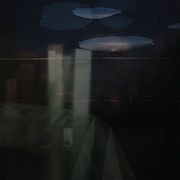Cocteau Twins aside it was This Mortal Coil which came to represent 4AD’s original “house style” – perhaps even more so, considering it was Ivo Watts-Russell’s own group. The band took influence from ambient music and psych, although without seeking to create a wholly “peaceful” atmosphere – the feeling that This Mortal Coil invoked was deeply melancholic; the kind that tints your surrounding environment with a solemnity. It’s an ambience simultaneously depressing and calming, even perhaps imbued with a kind of ancient quality – their song titles ‘Gathering Dust’ and ‘Filigree & Shadow’, for example, certainly seem to invoke this kind of imagery. All of this tends to mean that TMC are a band difficult to cite as a close influence, mainly down to how specific and rich with personality their sound world actually was.
Except, that is, for Demen, who channels this side of This Mortal Coil strongly through her genuinely mysterious debut, Nektyr. Released through Kranky on the strength of a demo, there is no other information available on her. That is, except for the fact that an artist called Irma Orm (which is Demen’s real name), designed album art for the Swedish black metal band Knieriem. Despite a similar image and penchant for the bleaker corners of the music spectrum, however, there is no direct metal influence present on Nektyr. The album art that accompanies Demen’s debut also follows in the same vein: it portrays vague shapes that look as if they could be blurred photographs of windows, corridors and light fixtures caught with limited exposure. As an artwork, there’s something indescribably “off” about the framing and composition of these forms – sinisterly so, even – and this is also very much apparent in the music.
Irma Orm’s work is most comparative to This Mortal Coil mainly through its slow, funeral procession chords and chiming vocal melodies. Demen’s influences, however, reach well beyond This Mortal Coil – perhaps just as comparable to the ominous new-age ambience of Aidan Baker’s Lost In The Rat Maze. And, as a result, Demen’s debut is more spacious sounding than the early 4AD artists, and in a sense more ambitiously cinematic: if This Mortal Coil represented a warm and dark sitting room, Demen captures more the flat, somewhat terrifyingly empty Scandinavian landscape. The English folkiness that occasionally crept through This Mortal Coil’s otherwise eerie ambience is not there to console through Demen’s heavily synthesised palette on Nektyr.
This album also might as well have been one single ‘dark ambient’ track interspersed with vocals – there is, after all, little variation and dynamic. But the development might be more on the part of the listener – adjusting to the space that Demen has created here. The claustrophobia manifests through the album’ emotionally unforgiving pace – Orm’s voice consistently sounds devoid of hopefulness, or even indignant anger. It is tired. Resultantly, it almost takes a strength to appreciate Nektyr from start to finish. And her voice, which is notably distinct and entirely original, provides a solid break away from Elizabeth Fraser comparisons. It’s not used in a particularly exaggerated way – unlike Elizabeth Fraser’s, it does not take centre stage on her pieces. Instead, it’s used instrumentally to add variation to dark drone.
‘Illdrop’ is the most moving and well-developed track on Nektyr, introduced by a soft gong-esque percussion. And, although perhaps more obvious in terms of composition, this song works because Orm’s voice is distinctive and urgent enough here to carry the it from the start. The more subtle use of percussion, too, gives ‘Illdrop’ a more intriguing and ultimately more immersive quality than many other tracks on the album. A running theme, much of the appeal of closing track ‘Flor’, once again, is due to the prominence of Orm’s vocals – providing a more hopeful melody, which pleasingly harmonises at times with the accompanying piano.
Demen’s debut album is worth listening to in its own right, regardless of any nostalgia for the 4AD sound. She takes a studied-sounding array of influences from contemporary ambient and drone, infusing them with a more operatic, vocalised melancholy. Nektyr is also impressively polished sounding for a debut, suggesting that any future work from Orm promises to be detailed, highly ambitious and distinctive. The album calls for repeat listens, mainly in adjustment to the sound world she has created here – it’s one which is at times too overwhelmingly sad to process.


